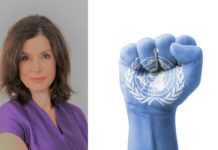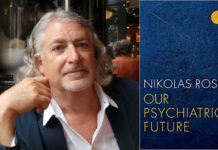Why Psychosis Is Not So Crazy: A Conversation with Stijn Vanheule
Vanheule urges clinicians to listen for the structure in psychotic thought. He offers clinical examples that reframe hallucinations as a form of creative response to unspeakable dilemmas.
Chemically Imbalanced: Joanna Moncrieff on the Making and Unmaking of the Serotonin Myth
Joanna Moncrieff joins Robert Whitaker to talk about her latest book, titled Chemically Imbalanced: The Making and Unmaking of the Serotonin Myth. They discuss the serotonin story and the fact that there is no good evidence that a serotonergic deficiency is a primary cause of depression.
The Poetics and Politics of Our Mental Health Metaphors: An Interview with Laurence Kirmayer
Ayurdhi Dhar interviews influential cultural psychiatrist Laurence Kirmayer on how metaphors, histories, and social structures contour our experiences of suffering and healing.
Psychotherapy and Social Change: Mick Cooper on Counseling, Pluralism, and Progressive Politics
Javier Rizo interviews Mick Cooper on the intersection of psychotherapy and social transformation, the pluralistic approach to counseling, and the role of psychology in building a more just society.
“All Real Living Is Meeting”: Brent Robbins on Love, Death, and the Possibilities of...
Psychologist and existential thinker Brent Robbins reflects on a lifetime of work, the limits of psychiatric diagnosis, and what facing mortality has taught him about joy and human connection.
Peer-Support Groups Were Right, Guidelines Were Wrong: Dr. Mark Horowitz on Tapering Off Antidepressants
In an interview with MIA, Dr. Horowitz discusses his recent article on why tapering off antidepressants can take months or even years.
Looking Beyond Self-Help to Understand Resilience: An Interview with Michael Ungar
Ayurdhi Dhar interviews Michael Ungar about how complex systems make us vulnerable and how resilience emerges in context-specific ways.
How Mad Studies and the Psychological Humanities are Changing Mental Health: An Interview with...
In this interview with MIA's Justin Karter, psychiatrist Bradley Lewis discusses the value of art, the humanities, and mad studies in shaping a richer understanding of psychological experiences.
Psychology, Personhood, and the Crisis of Neoliberalism: Jeff Sugarman on Theoretical and Critical Psychology
Tim Beck interviews Jeff Sugarman on the psychology of personhood, the influence of neoliberalism on mental health, and the need for a more philosophically informed psychology.
Psychology’s Small Stories and the Call of the Other: An Interview with David Goodman
Ayurdhi Dhar interviews David Goodman about his vision for a psychology grounded in care for the other, the risks of psychotherapeutic standardization, and why humility—and even embarrassment—may be vital to human flourishing.
Psychology: Flawed as a Science and as Evidence-Based Medicine
Peter Simons covers a paper arguing that “psychology is fundamentally incompatible with hypothesis-driven theoretical science,” another paper finding that evidence-based medicine is more corporate gimmick than reliable science, a study that found psychiatrists deliver the worst-quality healthcare of any medical specialty, and more!
How Culture Influences Voice Hearing: An Interview with Stanford Anthropologist Tanya Luhrmann
Ayurdhi Dhar interviews Tanya Luhrmann about cultural differences in voice-hearing, diagnosis and damaged identities, and conflicts in psychiatry.
From Freud to Fanon: How Daniel Gaztambide is Redefining Psychoanalytic Practice
In this interview, Daniel Gaztambide discusses how decolonial perspectives can transform psychoanalytic practice.
Context and Care vs. Isolate and Control: An Interview on the Dilemmas of Global...
MIA’s Ayurdhi Dhar explores with Arthur Kleinman how healthcare systems often overlook personal stories, focusing on treating diseases rather than individuals. Discover why this renowned Harvard psychiatrist and medical anthropologist believes in restoring humanity to medicine.
WHO and the Sea Change in Mental Health: Interview with Michelle Funk
MIA's Ana Florence interviews Michelle Funk about her leadership of the new WHO guidelines on rights-based mental health.
Psychiatry and the Selves We Might Become: An Interview with Sociologist Nikolas Rose
MIA’s Ayurdhi Dhar interviews the well-known sociologist of medicine, Nikolas Rose, about the role psychiatry plays in shaping how we manage ourselves and our world.
Beyond Paternalism or Abandonment in Mental Health Care: An Interview with Neil Gong
Neil Gong exposes the false choice in mental health policy between tolerant containment for the poor and paternalistic surveillance for the rich.
Demedicalizing Depression: An Interview with Milutin Kostić
Justin Karter interviews Milutin Kostić on the fundamental flaws in depression research and its neglect of human complexity.
Branding Diseases—How Drug Companies Market Psychiatric Conditions: An Interview with Ray Moynihan
MIA’s Ayurdhi Dhar interviews Ray Moynihan about the marketing of disorders, broadening of diagnoses, and harmful treatments.
Psychology is Not What You Think: An Interview with Critical Psychologist Ian Parker
MIA’s Ayurdhi Dhar interviews Ian Parker about critical psychology, discourse and political action, and whether psychology has anything left to offer.
How Grief Became a Disorder and What This Means About Us: An Interview with...
MIA’s Zenobia Morrill interviews psychologist Kaori Wada about what the creation of Prolonged Grief Disorder reveals about our culture and the current status of psychology.
Moving Mental Health Work Away from Diagnosis: Sarah Kamens and Peter Kinderman on New...
MIA's Justin Karter interviews two leaders of the Task Force on Diagnostic Alternatives, a group of mental health professionals who have issued an open letter demanding a new look at psychiatric diagnosis.
Undisclosed Financial Conflicts of Interest in the DSM-5: An Interview with Lisa Cosgrove and...
On the Mad in America podcast we talk with Lisa Cosgrove and Brian Piper about their BMJ paper entitled "Undisclosed Financial Conflicts of Interest in the DSM-5 TR: Cross-Sectional Analysis"
When Healing Looks Like Justice: An Interview with Harvard Psychologist Joseph Gone
MIA’s Ayurdhi Dhar interviews Joseph Gone about how a history of dispossession, conquest, and colonization shapes mental health outcomes in Native American communities.
The Social Unconscious and Character Formation in Neoliberal Culture: An Interview with Lynne Layton
MIA’s Javier Rizo interviews Lynne Layton about social psychoanalysis and how normative unconscious processes can help illuminate how oppressive systems get internalized and reproduced.

































